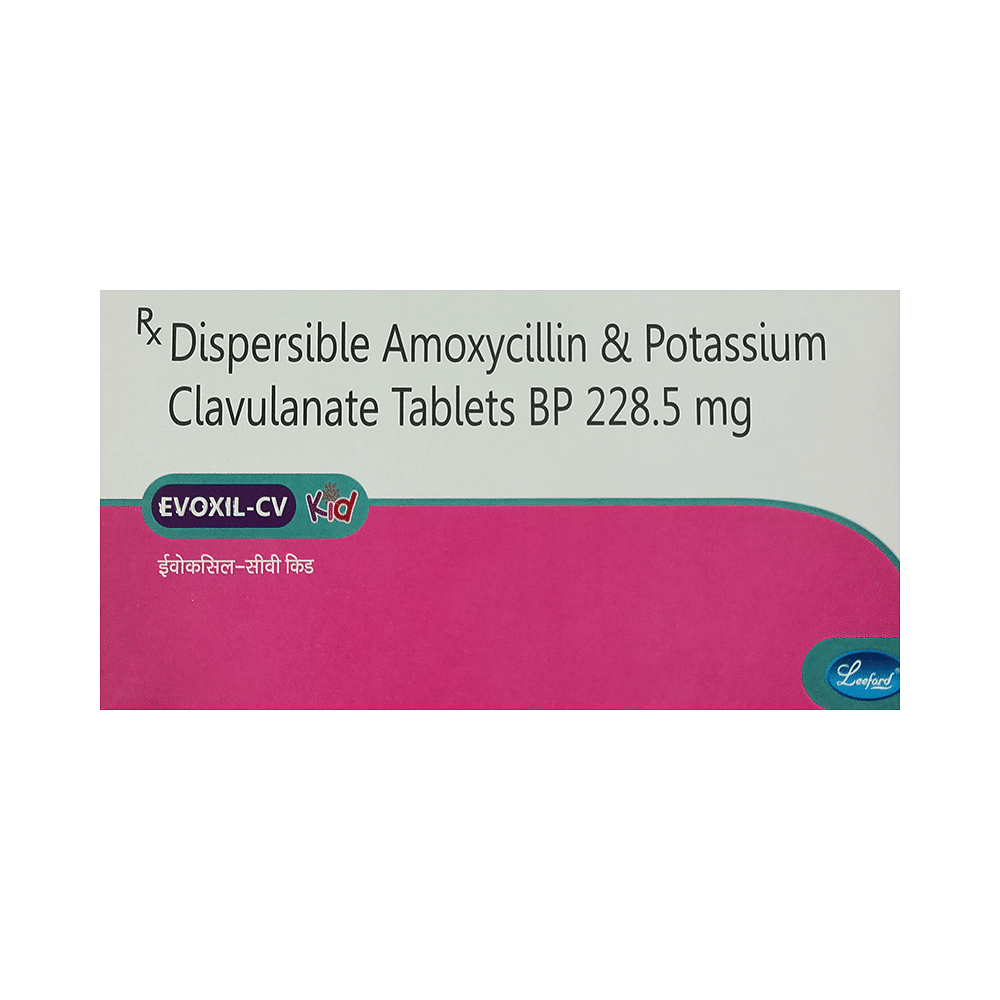
Lactoclaav Kid Tablet
Manufacturer
Cachet Pharmaceuticals Pvt Ltd
Salt Composition
Amoxycillin (200mg) + Clavulanic Acid (28.5mg)
Key Information
Short Description
Lactoclaav Kid Tablet is an antibiotic medicine that helps treat bacterial infections of the ear, nose, throat, chest, lungs, teeth, skin, and urinary tract.
Dosage Form
Tablet
Introduction
Lactoclaav Kid Tablet is an antibiotic medicine that helps treat bacterial infections of the ear, nose, throat, chest, lungs, teeth, skin, and urinary tract. It is capable of killing bacteria that have become resistant to other therapies and thus also helps treat tuberculosis that is resistant to other treatments.
Directions for Use
Never give Lactoclaav Kid Tablet until and unless prescribed by the doctor. You must also never share your child’s medicine with anyone else even if they show similar symptoms.
Safety Information
Side Effects
No common side effects listed.
How it works
Lactoclaav Kid Tablet is an antibiotic. It has two active agents amoxycillin and clavulanic acid. Amoxycillin works by preventing the formation of the bacterial protective covering (cell wall) essential for the survival of the bacteria. Whereas clavulanic acid serves a special purpose of inhibiting an enzyme (beta-lactamase) that is produced by resistant bacteria. This makes the combination of amoxycillin and clavulanic acid an effective line of treatment for many types of infections.
Quick Tips
Your child may have a bitter taste in the mouth after the intake of Lactoclaav Kid Tablet. Eating citrus fruit or sipping plenty of water or fruit juice may help. Encourage your child to drink plenty of water in case diarrhea develops as a side effect. Never give Lactoclaav Kid Tablet to treat common cold and flu-like symptoms caused by viruses. Never save medicine for future illnesses. It cannot be said whether the same medicine will work on future infections. Check ‘expiry’ before giving Lactoclaav Kid Tablet to your child. Immediately discard all the expired medicines. Stop Lactoclaav Kid Tablet immediately if your child develops an itchy rash facial swelling or breathing difficulty. Report to the doctor without any delay.
Related Medicines

Moxikind CV Kid Tablet

Miximox CV Kid 200mg/28.5mg Tablet

Medmox CV 200mg/28.5mg Tablet

Exclusive 200 mg/28.5 mg Tablet

Fanclav Kid 200mg/28.5mg Tablet

Meox CV Kid 200mg/28.5mg Tablet

Neomax Kid 200mg/28.5mg Tablet

Evoxil CV Kid Tablet

Sazomox CV Kid 200mg/28.5mg Tablet

Esmox CV 200mg/28.5mg Tablet
Frequently asked questions
Can other medicines be taken at the same time as Lactoclaav Kid Tablet?
Lactoclaav Kid Tablet may interact with other medications. Always inform your child's doctor about all medications or supplements they take before starting this medication. It is crucial to consult a healthcare professional before administering any medicine to your child, especially if combining it with any other medication.
Can I get my child vaccinated while on treatment with Lactoclaav Kid Tablet?
Antibiotics usually do not interfere with vaccine ingredients or cause adverse reactions in children who have recently received a vaccine. However, children undergoing antibiotic therapy should be postponed from receiving the vaccine until their illness is resolved. As soon as your child recovers, they can be given the vaccine.
Which lab tests may my child undergo while taking Lactoclaav Kid Tablet on a long-term basis?
Long-term use of this medication might necessitate periodic kidney and liver function tests by the doctor to monitor your child's condition.
Can I give a higher than the recommended dose of Lactoclaav Kid Tablet to my child?
No, exceeding the recommended dosage may increase risks of side effects. If your child experiences heightened symptoms, consult their doctor for an evaluation.
Can I stop giving Lactoclaav Kid Tablet to my child when the symptoms are relieved?
No, do not discontinue this medication until the full course is completed, even if you notice symptom relief. The infection may still be clearing up and continued use of the medicine may prove beneficial.
Can the use of Lactoclaav Kid Tablet cause diarrhea?
Yes, Lactoclaav Kid Tablet can induce diarrhea. It's an antibiotic that kills harmful bacteria while potentially disrupting helpful bacteria in your child's stomach and causing diarrhea. If your child experiences diarrhea, encourage them to drink fluids like water or other beverages. Contact a doctor if the diarrhea persists and you notice dehydration signs, such as reduced urination with dark-colored and strong-smelling urine.
Do all viral common colds result in secondary bacterial infection?
In most cases, bacterial infections do not follow viral ones. In fact, administering antibiotics to a child who has a viral infection can increase their risk of side effects. Consult your child's doctor for appropriate treatment before prescribing any antibiotics.
The mucus coming out of my child’s nose is yellow-green. Is it a sign of a bacterial infection?
Yellow or green discharge from the nose does not automatically indicate that antibiotics are needed, as is common during a common cold. Symptoms often resolve within 7-10 days.
Is there any sign which shows my child needs immediate medical attention?
Seek immediate medical attention if your child experiences severe allergic reactions (breathing difficulties, skin rashes), gastrointestinal issues (diarrhea), or signs of liver damage (weakness, paleness, vomiting). While rare, these are serious side effects that require expert medical intervention.


